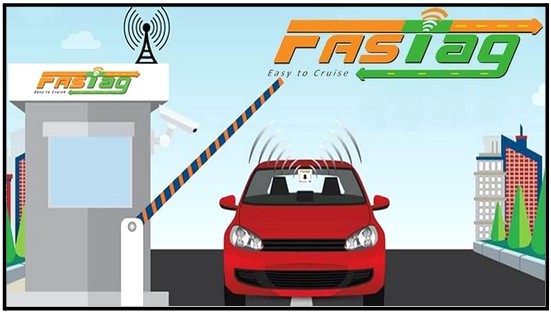In the news
The National Highways Authority of India (NHAI) has rolled out the 'One Vehicle, One FASTag' initiative, effective from April 1, 2024.
About the FASTag
- FASTag, a Radio Frequency Identification (RFID) tag, facilitates seamless toll payments directly from linked prepaid or savings/current accounts.
- Convenient Payment Method: FASTag enables toll payments without the need for cash transactions, directly deducting fares from the user's linked account.
- Vehicle-Specific: Issued based on the vehicle's registration certificate (RC), FASTag cannot be transferred to another vehicle once affixed to the windscreen.
- Efficient Toll Plaza Navigation: By affixing FASTag on the vehicle's windscreen, users can drive through toll plazas without halting for payments.
- Flexible Recharge Options: Users can recharge their FASTag through various payment methods such as BBPS, UPI, net banking, etc., provided by any bank.
- Accessibility: FASTag can be purchased from any National Electronic Toll Collection (NETC) Member Bank, facilitating widespread adoption.
- NETC Program: Developed by the National Payments Corporation of India (NPCI), the NETC program caters to India's electronic tolling requirements.
- Wide Adoption: With a penetration rate of around 98% and over 8 crore users, FASTag has transformed the country's Electronic Toll Collection system.
About the One Vehicle, One FASTag Concept
- The 'One Vehicle, One FASTag' initiative aims to curb the misuse of FASTags and streamline toll payment processes.
- Objective: To discourage the practice of using a single FASTag for multiple vehicles or associating multiple FASTags with one vehicle.
- Singular Ownership: Each vehicle owner is permitted to have only one active FASTag for one vehicle under this concept.
Why is there a need for One Vehicle, One FASTag?
The National Highways Authority of India (NHAI) introduced this initiative to address several issues:-
- KYC Compliance: Some instances of issuing multiple FASTags for a single vehicle without proper KYC verification, violating RBI mandates.
- Operational Efficiency: Encouraging proper affixing of FASTags on windshields to avoid unnecessary delays at toll plazas and inconvenience to other highway users.
Significance of the 'One Vehicle, One FASTag' Initiative
- Enhanced Efficiency of Electronic Toll Collection System
- By ensuring that each vehicle has only one active FASTag, the initiative streamlines toll collection processes, reducing the likelihood of errors and delays.
- This enhanced efficiency translates to smoother traffic flow at toll plazas, minimizing congestion and wait times for commuters.
- Seamless Movement at Toll Plazas
- With the implementation of the 'One Vehicle, One FASTag' policy, toll operations become more streamlined and organized.
- National highway users can experience seamless and uninterrupted journeys, as toll booths operate efficiently with FASTag-enabled transactions.
- Improved User Experience
- The initiative aims to provide a more comfortable and hassle-free experience for users of national highways.
- With FASTag, travelers no longer need to carry cash or wait in long queues at toll plazas, enhancing overall convenience.
- Promotion of Cashless Transactions
- By promoting the use of FASTag, the initiative encourages cashless transactions for toll payments.
- This shift towards digital payment methods aligns with broader government initiatives to promote a cashless economy and reduce reliance on physical currency.
- Benefits for Users
- FASTag offers various benefits to users, including savings on fuel and time.
- By eliminating the need to stop at toll plazas for cash transactions, FASTag users can save both fuel costs and valuable time during their journeys.
- Efficiency and Sustainability
- The 'One Vehicle, One FASTag' initiative contributes to the overall efficiency and sustainability of the transportation system.
- By reducing congestion and emissions associated with idling vehicles at toll booths, the initiative aligns with environmental and traffic management goals.
About the National Highways Authority of India (NHAI)
The National Highways Authority of India (NHAI) is a statutory body established by the NHAI Act of 1988.
Establishment and Mandate
- NHAI was created under an act of Parliament, the NHAI Act, 1988, to oversee the development, maintenance, and management of national highways in India.
- The authority is entrusted with the implementation of the National Highways Development Project (NHDP), India's largest-ever highways project, aimed at enhancing the country's road infrastructure in a phased manner.
Mission of NHAI
- Development, Maintenance, and Management of National Highways: NHAI's primary mission is to develop, maintain, and manage the national highways vested in it by the Government of India.
- Toll Collection and Traffic Regulation: NHAI is responsible for collecting toll fees on national highways and regulating the movement of vehicles to ensure proper management of the highways.
- Consultancy, Construction, and Research Activities: The authority provides consultancy and construction services both within India and internationally. NHAI also conducts research activities related to the development, maintenance, and management of highways to improve infrastructure standards and practices.
- Advisory Role: NHAI advises the Central Government on matters pertaining to highways, drawing on its expertise and experience in highway development and management.
- Collaboration with State Governments: NHAI collaborates with state governments, providing assistance and expertise in formulating and implementing highway development schemes. Such collaborations are based on mutually agreed terms and conditions to promote efficient and coordinated efforts in enhancing the highway network across the country.
Conclusion
The 'One Vehicle, One FASTag' initiative introduced by the National Highways Authority of India (NHAI) represents a significant step towards enhancing the efficiency and effectiveness of toll collection systems on national highways. By streamlining processes and encouraging the use of FASTags, the initiative not only improves the user experience but also promotes cashless transactions and contributes to the sustainability of the transportation infrastructure. Moreover, NHAI's broader mission to develop, maintain, and manage national highways underscores its crucial role in advancing India's road infrastructure and facilitating smoother, more seamless journeys for all highway users.

